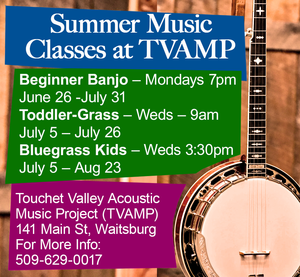FFA Gets Down and Dirty
April 10, 2014

Leighton Dorman and Chris Philbrook discover that manually collecting soil samples is not as easy as it looks. Meara Baker and Gillian Pope provide supervisory assistance.
WAITSBURG - It's a rare occasion when the field on the west side of the Highway, on Waitsburg's south side, receives more attention than Izzy the camel's turf on the east. But such was the case last week.
Dozens of Waitsburg students joined Mc- Gregor Company staff and Ag Center for Excellence representatives in an FFA-hosted Nutrients for Life Field Day in Perry Dozier's field on Thursday afternoon.
FFA Vice President Kimmie Hamann spearheaded the event as the culminating activity in Waitsburg FFA's Helping Communities Grow outreach program, through the Nutrients for Life Foundation. Hamann learned of the program when she noticed other chapters being recognized for it at last year's Washington State FFA Convention in Pullman. When she approached the Waitsburg chapter about the program, they were eager to participate.
Helping Communities Grow focuses on educating the local community on the importance of plant nutrition and the role it plays in food production. FFA chapters receive $500 from Nutrients for Life Foundation by successfully designing and completing their program. The top three chapters in each state receive monetary awards of $5,000, $3,000 and $1,000 for first, second and third place. To qualify, chapters must create a program that is tied to the Nutrients for Life curriculum, collaborate with a local plant health and fertilizer business and involve community outreach.
Hamann, assisted by Meara Baker and Chelsey Brannock, took the lead in teaching 7th and 8th grade science classes, for two days, using lessons - chosen specifically to coincide with the Field Day -- from the Nutrients for Life curriculum. Students studied Plant-Soil Interactions, Properties of Soil and Plant Nutrient Deficiencies.
"Students became 'plant doctors' looking at different case studies of corn and deciding what nutrients were lacking in the soil and how the problem could be corrected," said Hamann. At the same time, High School Ag Science teacher and FFA Advisor Nicole Abel covered same information in her freshman Ag Science class.
The lessons became hands-on when all three classes walked to Dozier's field on Friday afternoon, where McGregor representatives were ready to help the kids get their hands dirty with some hands-on soil testing. McGregor Training and Recruiting Coordinator Leslie Hammer and Agronomist Trainee Dustin Crawford spoke with the students and demonstrated how to take a soil sample using a hydraulic sampler. They also took questions from the audience about their positions, roles in the industry and what types of classes they took in college.
Bill Griffith, Director of the Ag Center for Excellence Advisory Board at Walla Walla Community College, and board member Patty Hurin were also on hand and talked with students about the number and variety of ag-related job opportunities
Students were then split into groups, assigned a bucket and a soil probe and sent off to gather samples from within a marked acre of land. "The whole thing was very hands-on and visual," said Abel. "Because one-acre was marked out with orange flags, it was easy for the kids to visualize just how big an acre is."
After collecting samples, students came together to analyze spreadsheet data from a previously collected sample. "It was very practical," said Abel. "We saw that corn needs 20 lbs. of sulfur and the soil had 10. Would it be reasonable to plant corn? Is that something that could be supplemented with fertilizer? We narrowed it down to three crops that would do well in that field - corn, Soft White Wheat and Dark Northern Spring Wheat - and then looked at when to plant and what we would need to add."
The program was deemed an all-around success. "The kids enjoyed the experience as we are currently in chemistry studying the periodic table of elements, reaction rates, compounds, etc. It was good to learn about nitrogen, phosphorus, potassium and zinc in regards to the livelihoods of the local farmers. One of the students asked, 'Does this mean the farmers have to know chemistry?' It is always a win-win situation when you can connect students to people working within the community. Many were very interested in future job possibilities," said Middle School Science Teacher Lynn Martin.
Hamann, who is considering a career in the classroom or as an extension agent, valued the teaching experience. "I had a lot of fun with the whole thing!" she said. "Teaching the lessons to the 7th and 8th graders was interesting because I'd never done anything like that before, but it was a great experience and it was fun getting to interact with them. I was learning right along with them because some of the experiments I had never done either!
"I'm very thankful to Mrs. Abel, Ms. Martin, and Leslie Hammer for helping me organize the lessons and field day," Hamann continued. "I couldnrsaquo;t have done it without their support! I also want to thank Dustin Crawford for teaching the kids at the field day and Perry Dozier for letting us use his property for the event."








Reader Comments(0)